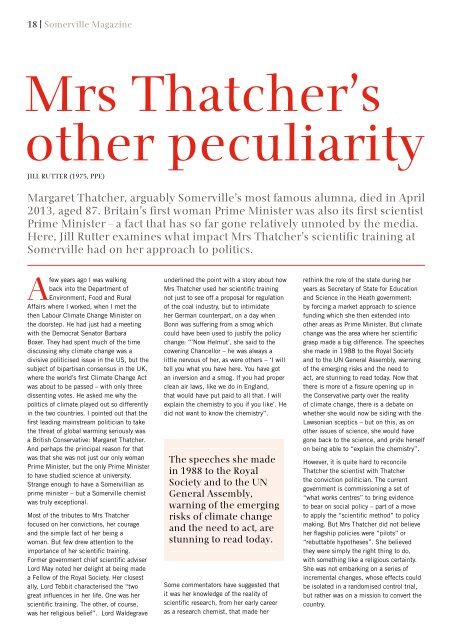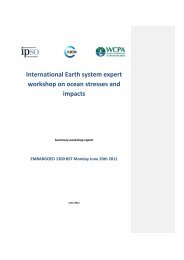here - Somerville College
here - Somerville College
here - Somerville College
- No tags were found...
You also want an ePaper? Increase the reach of your titles
YUMPU automatically turns print PDFs into web optimized ePapers that Google loves.
18 | <strong>Somerville</strong> MagazineMrs Thatcher’sother peculiarityJill Rutter (1975, PPE)Margaret Thatcher, arguably <strong>Somerville</strong>’s most famous alumna, died in April2013, aged 87. Britain’s first woman Prime Minister was also its first scientistPrime Minister – a fact that has so far gone relatively unnoted by the media.Here, Jill Rutter examines what impact Mrs Thatcher’s scientific training at<strong>Somerville</strong> had on her approach to politics.Afew years ago I was walkingback into the Department ofEnvironment, Food and RuralAffairs w<strong>here</strong> I worked, when I met thethen Labour Climate Change Minister onthe doorstep. He had just had a meetingwith the Democrat Senator BarbaraBoxer. They had spent much of the timediscussing why climate change was adivisive politicised issue in the US, but thesubject of bipartisan consensus in the UK,w<strong>here</strong> the world’s first Climate Change Actwas about to be passed – with only threedissenting votes. He asked me why thepolitics of climate played out so differentlyin the two countries. I pointed out that thefirst leading mainstream politician to takethe threat of global warming seriously wasa British Conservative: Margaret Thatcher.And perhaps the principal reason for thatwas that she was not just our only womanPrime Minister, but the only Prime Ministerto have studied science at university.Strange enough to have a Somervillian asprime minister – but a <strong>Somerville</strong> chemistwas truly exceptional.Most of the tributes to Mrs Thatcherfocused on her convictions, her courageand the simple fact of her being awoman. But few drew attention to theimportance of her scientific training.Former government chief scientific adviserLord May noted her delight at being madea Fellow of the Royal Society. Her closestally, Lord Tebbit characterised the “twogreat influences in her life. One was herscientific training. The other, of course,was her religious belief”. Lord Waldegraveunderlined the point with a story about howMrs Thatcher used her scientific trainingnot just to see off a proposal for regulationof the coal industry, but to intimidateher German counterpart, on a day whenBonn was suffering from a smog whichcould have been used to justify the policychange: “’Now Helmut’, she said to thecowering Chancellor – he was always alittle nervous of her, as were others – ‘I willtell you what you have <strong>here</strong>. You have gotan inversion and a smog. If you had properclean air laws, like we do in England,that would have put paid to all that. I willexplain the chemistry to you if you like’. Hedid not want to know the chemistry”.The speeches she madein 1988 to the RoyalSociety and to the UNGeneral Assembly,warning of the emergingrisks of climate changeand the need to act, arestunning to read today.Some commentators have suggested thatit was her knowledge of the reality ofscientific research, from her early careeras a research chemist, that made herrethink the role of the state during heryears as Secretary of State for Educationand Science in the Heath government:by forcing a market approach to sciencefunding which she then extended intoother areas as Prime Minister. But climatechange was the area w<strong>here</strong> her scientificgrasp made a big difference. The speechesshe made in 1988 to the Royal Societyand to the UN General Assembly, warningof the emerging risks and the need toact, are stunning to read today. Now thatt<strong>here</strong> is more of a fissure opening up inthe Conservative party over the realityof climate change, t<strong>here</strong> is a debate onwhether she would now be siding with theLawsonian sceptics – but on this, as onother issues of science, she would havegone back to the science, and pride herselfon being able to “explain the chemistry”.However, it is quite hard to reconcileThatcher the scientist with Thatcherthe conviction politician. The currentgovernment is commissioning a set of“what works centres” to bring evidenceto bear on social policy – part of a moveto apply the “scientific method” to policymaking. But Mrs Thatcher did not believeher flagship policies were “pilots” or“rebuttable hypotheses”. She believedthey were simply the right thing to do,with something like a religious certainty.She was not embarking on a series ofincremental changes, whose effects couldbe isolated in a randomised control trial,but rather was on a mission to convert thecountry.
















